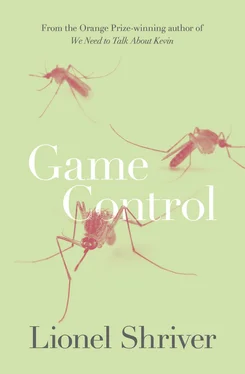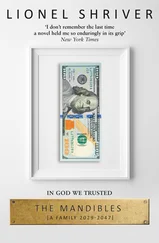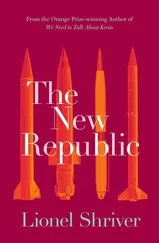He almost left her alone, so apparent was her desperation to be overlooked, but were she allowed to achieve what she thought she wanted—solitude—she would be miserable. More, he couldn’t resist a woman whose instinct with Calvin Piper on stage was to sneak in the opposite direction.
“Pardon—” At his hand on her sleeve, she jumped. “Have you a clue where I might get a spot of tea?”
She stumbled through something about the kitchen, leaving him in no doubt that contact with another human being was the most fearsome thing that had ever happened to her.
He returned with his cup to find her on the veranda as if they had an assignation. “Astonishing sky, isn’t it?” A moan of assent. About her frantic desire that he should go away he had no illusion. But winning her from a bogus trip to the loo was a snap. “Sorry,” he introduced, after an unencouraging but obligatory exchange about where she was from and where she lived. “I’m Wallace Threadgill. And yourself?”
That was all it took. She stopped leaning over the railing and gaping dolefully at the Jasper Johns Equatorial skyscape and faced him with keen reassessment. “Eleanor Merritt.” Though she needn’t, she shook hands, and he was struck by the fact that now, far from wishing he would disappear, she was suddenly worried he might leave.
“And what brings you to this blithe bacchanalia?”
She laughed, dry. “Awful, aren’t they. I always promise myself I won’t go. And then the alternative is staying home …”
“What’s wrong with home?”
“Malicious furniture.” Her eyes kept darting to his face, then back over the rail.
“I’m surprised you’re not attending to our charming ersatz host. Funny, you’d never know, would you, that this wasn’t his house? And how high are the chances that he and his whole band of cronies weren’t even invited?”
“Some people are very—comfortable, socially.” A diplomat. “I’m not. I like to think I’ve improved, but I doubt it. Every time I walk into a party I feel thirteen: dressed like a ninny, terrified of dancing and wishing I’d brought a book.”
“How does such a shy creature come to be in Africa?”
“Family planning,” she groaned.
“Ah.” That explained the shift.
“And you—you’re the heretic.”
He smiled. “Quite. And how long have you—?”
“Nearly twenty years. I was with the UNFPA before Pathfinder, and the Peace Corps before that.”
“Peace Corps I could have predicted.”
She stood more upright. “Everyone finds the Peace Corps so hilarious. That we’re a sad little sort. But it’s done some fine—”
“Look at you. You’re already getting kali .”
“I just don’t think it’s fair—”
“Perhaps you and I are such natural enemies that we should acknowledge irreconcilable differences and skip the fisticuffs.” He made a motion as if to part.
“No, please—” She touched his arm. “I have always wanted to talk to you. More than ever now.”
“Why? Are you questioning your faith?”
“Let’s say my convictions have been challenged. They are not bearing up well.”
“But you have a life’s work to defend. No doubt you believe in its merit and conduct it conscientiously. But in my experience, your kind find my message unsettling. They listen only just so long as it takes to invent all the reasons I’m a hairbrain. They march off with their fences built even higher than before, having learned nothing. I’m a little tired of wasting my time. It’s more than likely we have little to say to one another.”
“I’m not afraid of information.”
“Then you are a brave young lady. The entire population industry is mortified by information. That’s why they make it up. So they can live safely in their fairy-tale future, where we are all balancing tiptoe on one leg in the remaining three square inches apportioned to us, packed on all sides by the seething, copulating ruck, fallen angels on the head of a pin. But look around you.” He waved his hand at the Ngong Hills as a voluptuous breeze ruffled her soft brown hair; indeed, from here there was not a glimmer of human habitation in sight.
“My confidence in what I do has been shaken,” she admitted. “We’ve had so little effect.”
“Large families will persist. But you can make people ashamed of their children, just as Jesuits made women ashamed of their breasts. You see, I don’t simply believe that population programmes are inadequate; I believe they are evil.”
“That’s going a bit far.”
“Let me tell you a story,” Threadgill intoned, leading her to a porch chair and seating himself at an instructive angle.
“I was Kenyan-born,” he began, “but educated in Britain. It was the late sixties, when horrors were foretold for the land that I still cared for very much. You may remember, in those days it was to be thirty-three billion by the turn of the next century—and isn’t it intriguing that twenty years later the same prophets are now saying fourteen? So I enrolled in Oxford’s new Population Studies programme, and went from there to work for the Population Reference Bureau in DC. My life was numbers. We ran the profession’s first computer simulations, and when the zeros trilled off perforated sheets my blood would pound. Money pumped into the field and I could travel. Reports with their daunting digits stacked my desk. At night my colleagues and I would gather at exclusive clubs and loudly compare the multiple nightmares sponsored by our competing organizations. Everywhere we went, our lapels flashed ZPG.
“My work was going well and I was important. Yet the better it went, the more my soul was sick. I drank heavily. My relations with women were frantic and short-lived, and I was careful not to beget children. I began to develop health problems—I was pre-ulcerous and probably an alcoholic. Inside I was heavy, and though I was free to see the sights of the world the earth was a bleak and hopeless coal to me, and showed itself in dark pieces. Every new country appeared distraught and degraded, perched on a precipice, about to fall apart.
“One day I was walking out of the Kenyatta Centre, during one of those costly conferences we were so fond of. I ran into a young Luhya I did not know, with his small son. He was angry and accosted me. ‘You are the enemy of the smile on this child’s face!’ he cried. The boy looked at me, and he had supernatural eyes. I realized the man was right, that my work was all about preventing his son’s conception. I was relieved that his parents had prevailed over my reports. I wasn’t sure of myself then, as you are not now, and until I was sure again I would cast my ZPG pin in the gutter.
“I entered into a different sort of research, the kind where you are not given the answers before you begin. I was astonished at what I found. Most of all, I was amazed that the facts I uncovered were easily available to everyone, and I became appalled by a conspiracy of despair, a pact of gloom to which I had signed my own name.
“Because the holocaust of the population explosion is a myth. That we are all dropping into a fetid cesspool is a myth. Life on earth, historically, has done nothing but improve. And the profusion of our species is not a horror but a triumph. We are a thriving biological success story. There is no crisis of ‘carrying capacity’—since the Second World War, the species has only been better fed. Per capita calorie production continues to rise. Incidence of famine over the last few hundred years has plummeted. Arable land is on the increase. Pollution levels are declining. Resources are getting cheaper. The only over-population I uncovered was in organizations like the one I worked for, which were a scandal.
“Yet when I attempted to publish these findings, I was turned away from every journal and publisher I approached. I finally found one feisty university press. But that spelt the end of me. Once word was out I had parted with orthodox demography, I lost my funding. I became a clown for my fellows. There is nothing so absurd to a Western academic as an optimist.
Читать дальше












